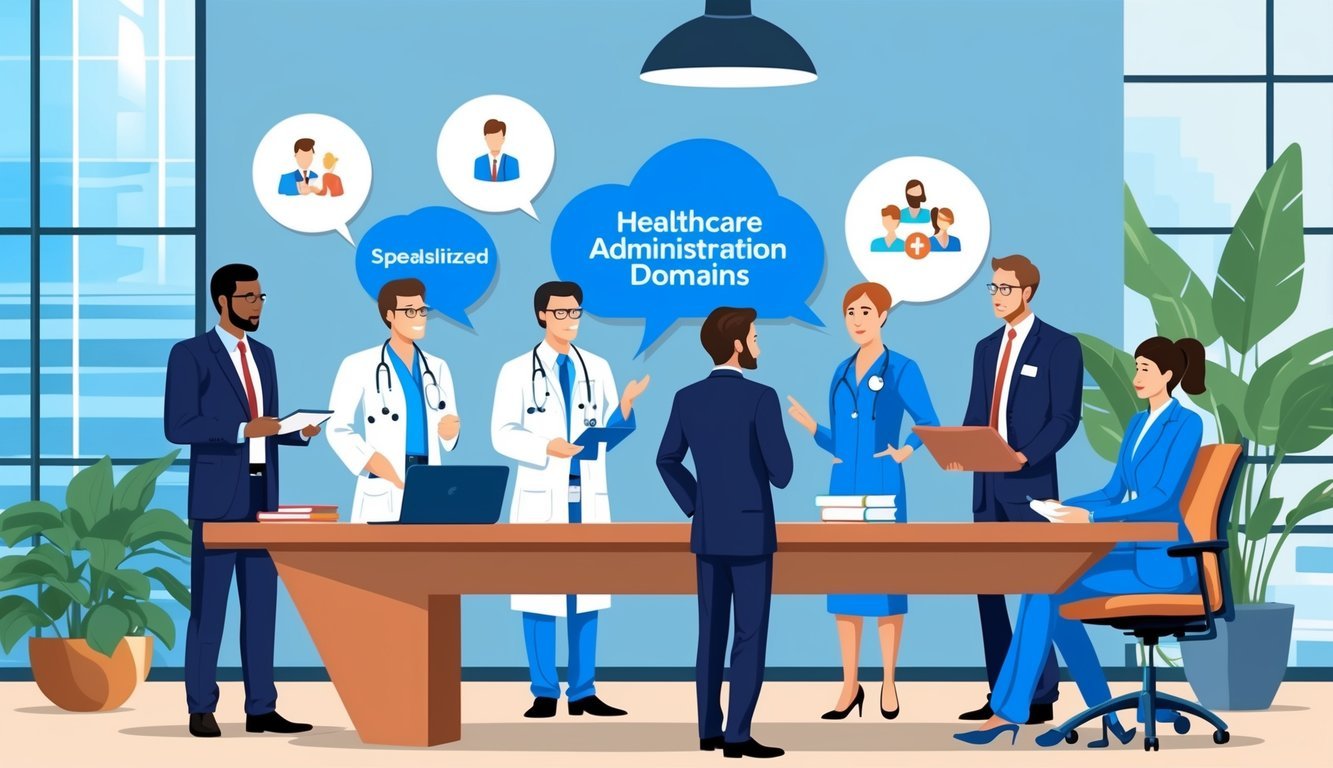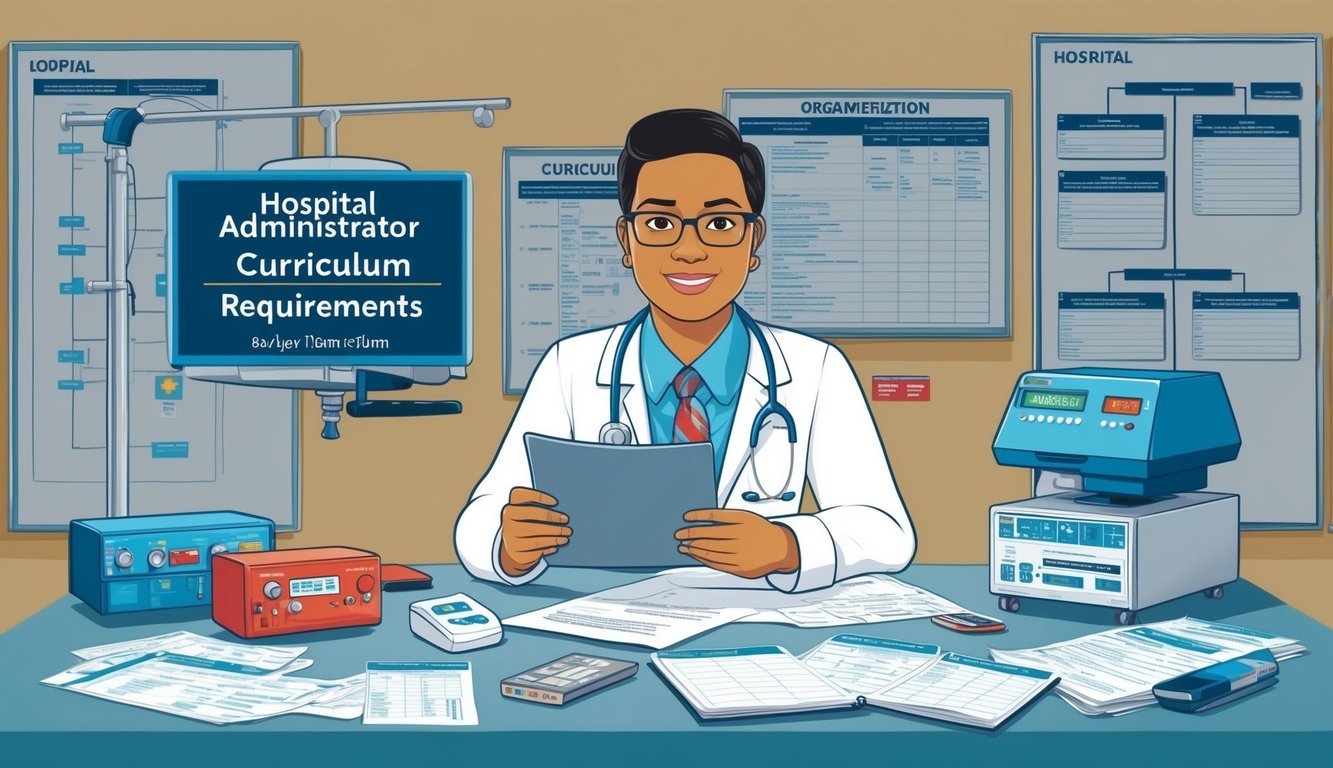A healthcare administration degree opens the door to a variety of rewarding career paths in the medical field.
Typically, you need to complete coursework that covers key areas like finance, management, and healthcare laws to pursue this degree.
Understanding the requirements for this degree is essential if you want to make a real impact on healthcare delivery and administration.
As you explore this path, you’ll encounter various options, from associate degrees to advanced doctoral programs.
Each level offers unique insights and prepares you for specific roles within the healthcare system.
Specializing in areas such as health informatics or hospital management can also enhance your career opportunities and professional growth.
By understanding the core competencies and educational pathways involved, you can make informed decisions about your future in healthcare administration.
Whether you aim to manage a small clinic or oversee a large healthcare organization, this degree provides the foundation necessary to succeed in a complex and dynamic field.
Key Takeaways
- Explore different educational pathways to find the right fit for your career.
- Develop key competencies that are crucial for effective healthcare management.
- Gain insights into career opportunities that can lead to professional growth.
Core Educational Pathways
When pursuing a career in healthcare administration, understanding the necessary educational pathways is crucial.
Your journey typically begins with an undergraduate degree and may continue with graduate studies.
You have the option of choosing between online and in-person programs, which can impact your experience and learning outcomes.
Undergraduate Studies
To set a solid foundation in healthcare administration, you can start with a bachelor’s degree in healthcare administration.
This degree generally covers key subjects such as healthcare policy, management, and financial systems in healthcare environments.
Common admission requirements include:
- A high school diploma or equivalent.
- Minimum GPA standards.
- Letters of recommendation.
Some programs may also offer associate degrees as a stepping stone.
These typically require about two years of study and provide essential knowledge for entry-level positions in healthcare facilities. Explore undergraduate options here.
Graduate Studies
After earning your bachelor’s degree, advancing your education with a Master of Healthcare Administration (MHA) can enhance your career prospects.
This graduate degree is often required for leadership roles.
Most programs demand:
- A completed bachelor’s degree from an accredited institution.
- A competitive GPA, typically 3.0 or higher.
- GRE or GMAT scores for some schools.
Graduates of MHA programs are equipped with critical skills in organizational management and healthcare operations.
You can find various graduate options that suit your schedule and career goals. Learn more about graduate requirements.
Online vs. In-Person Degree Programs
Choosing between online and in-person degree programs is important for your educational experience.
Online MHA programs offer flexibility, allowing you to balance work and study.
They often include the same curriculum as traditional classes but focus on self-paced learning.
In-person programs foster direct interaction with faculty and peers, enhancing networking opportunities.
Some students prefer this setup for real-time discussions and hands-on learning experiences.
Weigh the pros and cons based on your personal preferences and career plans. Find more about online vs. in-person options.
Key Administration Competencies

In healthcare administration, certain competencies are essential for effective management and leadership.
You need to cultivate skills that enhance communication, understanding of policy, and the ability to lead and manage teams effectively.
Leadership and Management Skills
Strong leadership is crucial in healthcare settings.
Effective leaders inspire their teams and make informed decisions.
You should focus on developing skills such as strategic planning, problem-solving, and risk management.
Understanding healthcare operations and ensuring compliance with regulations are vital.
You also need to demonstrate emotional intelligence to build trust and rapport with your team.
Regular professional development can help you improve these skills.
Key Leadership Skills:
- Strategic Planning: Set long-term goals for your organization.
- Problem-Solving: Make decisions based on data and evidence.
- Risk Management: Identify and mitigate potential risks.
Communication and Interpersonal Skills
Effective communication is vital for successful healthcare administration.
You must be able to convey information clearly to both staff and patients.
Strong interpersonal skills help you build relationships and enhance teamwork.
Listen actively and practice empathic communication to address concerns effectively.
Good communication can reduce errors and improve patient satisfaction.
Training in communication skills can significantly enhance your effectiveness as an administrator.
Important Communication Skills:
- Active Listening: Ensure all team members feel heard.
- Clear Messaging: Use straightforward language to avoid confusion.
- Feedback: Provide constructive criticism and praise.
Understanding of Healthcare Policy and Law
A solid grasp of healthcare policy and law is essential.
You should know relevant regulations to ensure compliance and minimize legal risks.
This knowledge helps in making informed decisions that affect your organization.
Staying updated on changes in healthcare policy is important for effective management.
You can enhance your understanding through continuous professional education or resources.
Key Areas to Focus On:
- Compliance: Ensure that your organization follows laws and regulations.
- Risk Management: Create strategies to mitigate legal risks.
- Policy Updates: Regularly review changes in healthcare laws.
Specialized Domains in Healthcare Administration

In healthcare administration, there are several specialized domains that play crucial roles in ensuring effective operations.
Understanding these key areas can greatly enhance your ability to manage healthcare services effectively.
Health Information Management
Health Information Management (HIM) focuses on acquiring, analyzing, and protecting patient information.
Your role in HIM involves overseeing medical records and ensuring they comply with regulations.
HIM professionals work with various data management systems, which are vital for improving patient care and privacy.
You will need to be skilled in technologies that handle electronic health records (EHR) efficiently.
Fundamental skills in HIM include:
- Data Analysis: Interpreting patient data for improved healthcare delivery.
- Compliance Knowledge: Understanding laws like HIPAA that protect patient information.
- Clinical Terminology: Familiarity with medical terms for accurate data handling.
For insights on managing health information, check out this guide on Health Information Management.
Financial Management in Healthcare
Financial management is crucial in overseeing a healthcare organization’s budget and expenses.
As a finance manager, you will analyze costs related to patient care, staff salaries, and facility operations.
Your responsibilities will also include:
- Budgeting: Developing financial plans that align with healthcare goals.
- Revenue Cycle Management: Ensuring timely billing and collections to maintain cash flow.
- Financial Reporting: Creating detailed reports for stakeholders to review fiscal health.
Understanding how to navigate healthcare finance is essential for enhancing the efficiency of your organization.
Learn more about financial management in this section on Healthcare Finance.
Human Resource Management in Healthcare Settings
Human Resource Management (HRM) in healthcare ensures that staff are effectively recruited and trained.
You will play a key role in fostering a positive work environment that attracts quality healthcare professionals.
Key duties include:
- Staffing: Hiring qualified individuals who meet the demands of patient care.
- Training and Development: Offering programs that enhance professional skills.
- Performance Management: Evaluating staff contributions to improve patient outcomes.
HRM is essential for maintaining a motivated workforce, which directly affects the quality of care provided.
For a deeper dive into HR management in healthcare, visit this resource on Human Resource Management.
Strategic Operations and Healthcare Systems

In healthcare, understanding strategic operations and healthcare systems is essential.
You will explore how these elements contribute to effective management, patient safety, and quality improvement.
Healthcare Systems and Services
Healthcare systems involve structured networks that provide health services.
This includes hospitals, outpatient facilities, and community services.
Understanding the roles of each component helps you as a healthcare manager identify areas for improvement.
Key components of healthcare systems include:
- Primary Care: The first point of contact for patients.
- Specialty Care: Focused medical services for specific conditions.
- Emergency Services: Immediate care for urgent health issues.
You should also consider the integration of technology within these systems.
Health information systems improve communication and enhance patient care.
Familiarizing yourself with various systems can help you implement changes that lead to better health outcomes.
Quality Improvement and Patient Safety
Quality improvement focuses on enhancing patient care through systematic changes.
You will learn about frameworks, such as Plan-Do-Study-Act (PDSA), that guide these improvements.
Key strategies include:
- Data Analysis: Gathering patient feedback and performance metrics.
- Training Programs: Educating staff to follow best practices.
- Process Design: Streamlining operations to reduce errors.
Patient safety is a critical aspect of healthcare management.
It involves implementing policies that minimize risks to patients.
This includes creating a culture where staff feel comfortable reporting safety concerns.
Healthcare Strategic Planning and Development
Strategic planning is vital for ensuring that healthcare organizations meet their goals.
You will engage in systems thinking to assess current operations and strategize for future improvements.
Key steps in strategic planning include:
- SWOT Analysis: Evaluating strengths, weaknesses, opportunities, and threats.
- Setting Objectives: Defining clear, measurable goals.
- Resource Allocation: Ensuring that funding and staff are efficiently utilized.
Regular assessments and adaptations to these plans keep healthcare systems responsive.
Your role as a health services manager will include fostering a culture of strategic thinking throughout the organization.
This enables sustained improvement and adaptability in an ever-changing healthcare landscape.
Career Opportunities and Professional Growth
Exploring a career in healthcare administration offers a range of job opportunities and paths for professional development.
Understanding the job roles and essential experience required can help you navigate this field effectively.
Healthcare Administration Career Overview
A career in healthcare administration can lead to various roles, including medical and health services manager, healthcare consultant, and nursing home administrator.
These positions focus on improving healthcare services and managing operations in various settings like hospitals, clinics, and nursing homes.
The U.S. Bureau of Labor Statistics projects a 28% job growth for medical and health services managers from 2022 to 2032, which is much faster than the average for all occupations.
You may find yourself working alongside healthcare executives to implement new policies and enhance patient care.
Essential Experience and Credentials
To excel in healthcare administration, specific educational credentials and relevant experience are essential.
Most positions require, at a minimum, a bachelor’s degree in healthcare administration or a related field.
Advanced roles may ask for a master’s degree, such as an MBA with a healthcare focus.
Practical experience in healthcare settings is crucial.
Internships or entry-level roles, such as being a healthcare coordinator, allow you to gain hands-on experience.
Certifications, like Certified Nurse Manager and Leader (CNML), can further enhance your qualifications and marketability in this competitive field.
Job Roles and Responsibilities
Healthcare administrators take on various responsibilities depending on their specific roles.
Here’s a look at some common job roles in this field:
| Job Role | Responsibilities |
|---|---|
| Medical and Health Services Manager | They oversee healthcare operations, manage budgets, and ensure compliance with regulations. |
| Healthcare Consultant | They advise organizations on improving efficiency and quality of care. |
| Nursing Home Administrator | They manage operations of long-term care facilities, ensuring quality resident care. |
| Chief Nursing Officer | They lead nursing departments, develop policies, and improve patient care standards. |
As you pursue a career in healthcare administration, understanding these roles and their responsibilities will help you align your goals with available opportunities in the field.
Frequently Asked Questions

As you explore a career in healthcare administration, it’s common to have questions about education, prerequisites, and career paths.
Understanding these details can help you make informed decisions about your future in this field.
What level of education is required for a career in healthcare administration?
A bachelor’s degree in healthcare administration is typically the minimum requirement.
Some positions may prefer candidates with a master’s degree, like a Master of Healthcare Administration (MHA).
This advanced degree can open up more leadership roles and higher salaries.
You can learn more about various degree options through Nurse.org.
What are the typical prerequisites for enrolling in a healthcare administration degree program?
Prerequisites often include a high school diploma or GED.
Some programs may require prior coursework in subjects like biology or business.
You should also check if your chosen college expects letters of recommendation or standardized test scores.
How do healthcare administration degree requirements vary from state to state?
Requirements can differ based on state regulations and specific employer needs.
Some states may have additional licensure for certain administrative roles.
You’ll need to research your state’s requirements thoroughly for accurate guidance.
Checking with local colleges or state health departments can provide more information.
What are the potential career opportunities after obtaining a degree in healthcare administration?
With a degree in healthcare administration, you can pursue various roles.
Common positions include healthcare manager, health services director, and patient care coordinator.
These roles exist in hospitals, clinics, and nursing homes.
Each position offers different responsibilities and growth opportunities.
Are there any specific certifications necessary for a career in healthcare administration?
While not always required, certifications can enhance your job prospects.
Options include Certified Healthcare Administrator (CHA) or Fellow of the American College of Healthcare Executives (FACHE).
These certifications demonstrate your expertise and commitment to the field.
They can be beneficial when applying for leadership roles.
What advanced degrees are available for professionals in the healthcare administration field?
Beyond a bachelor’s degree, you may consider a Master of Healthcare Administration (MHA) or a Master of Business Administration (MBA) with a focus in healthcare.
Doctoral programs, such as a Doctor of Healthcare Administration (DHA), are also available for those seeking top-level positions.
Each of these degrees prepares you for more complex challenges in healthcare leadership.

